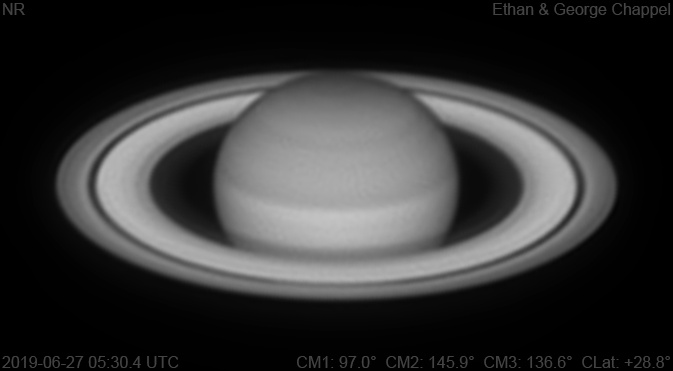
Saturn UTC
CM1: 97.00°
CM2: 145.90°
CM3: 136.60°
CLat: +28.80°
Description
Despite being heavily obscured by clouds, I wasn't planning to give up as long as I could see Saturn on the screen, and it stayed visible long enough to capture enough near-infrared data for an image.
Notes:
- The North Temperate Belt stands out as being distinctly dark in an area with little contrast otherwise.
Equipment
ZWO ASI290MM
Astro-Physics Advanced Convertible Barlow
Celestron EdgeHD 14
Logs
FireCapture v2.6 Settings ------------------------------------ Observer=Ethan Chappel Camera=ZWO ASI290MM Filter=IR Profile=Jupiter Diameter=45.60" Magnitude=-2.59 CMI=301.6° CMII=337.4° CMIII=312.1° (during mid of capture) Filename=2019-06-27-0527_0-EC-IR-Jup.ser Date=2019_06_27 Start=05_26_26.476 Mid=05_27_04.572 End=05_27_42.668 Start(UT)=05_26_26.476 Mid(UT)=05_27_04.572 End(UT)=05_27_42.668 Duration=76.192s Date_format=yyyy_MM_dd Time_format=HH_mm_ss LT=UT -6h Frames captured=299 File type=SER Binning=no Bit depth=8bit Debayer=no ROI=968x522 ROI(Offset)=0x0 FPS (avg.)=3 Shutter=30.63ms Gain=486 (81%) AutoGain=off USBTraffic=40 (off) FPS=100 (off) Gamma=50 SoftwareGain=10 (off) AutoExposure=off HighSpeed=off Brightness=1 (off) AutoHisto=75 (off) Histogramm(min)=0 Histogramm(max)=255 Histogramm=100% Noise(avg.deviation)=5.65 AutoAlign=false PreFilter=none Limit=120 Seconds Sensor temperature=33.2°C Focuser position=4750 FireCapture v2.6 Settings ------------------------------------ Observer=Ethan Chappel Camera=ZWO ASI290MM Filter=IR Profile=Jupiter Diameter=45.60" Magnitude=-2.59 CMI=303.7° CMII=339.4° CMIII=314.1° (during mid of capture) FocalLength=5900mm (F/21) Resolution=0.10" Filename=2019-06-27-0530_4-EC-IR-Jup.ser Date=2019_06_27 Start=05_29_24.020 Mid=05_30_24.034 End=05_31_24.048 Start(UT)=05_29_24.020 Mid(UT)=05_30_24.034 End(UT)=05_31_24.048 Duration=120.028s Date_format=yyyy_MM_dd Time_format=HH_mm_ss LT=UT -6h Frames captured=3310 File type=SER Binning=no Bit depth=8bit Debayer=no ROI=968x522 ROI(Offset)=0x0 FPS (avg.)=27 Shutter=30.63ms Gain=425 (70%) AutoGain=off USBTraffic=40 (off) FPS=100 (off) Gamma=50 SoftwareGain=10 (off) AutoExposure=off HighSpeed=off Brightness=1 (off) AutoHisto=75 (off) Histogramm(min)=0 Histogramm(max)=188 Histogramm=73% Noise(avg.deviation)=3.12 AutoAlign=false PreFilter=none Limit=120 Seconds Sensor temperature=33.1°C Focuser position=4750